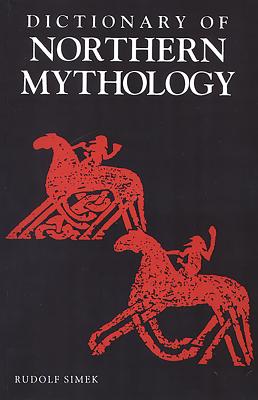A Dictionary of Northern Mythology

A Dictionary of Northern Mythology
For two and a half thousand years, from 1500 BC to AD 1000, a culture as significant as the classical civilisation of the Mediterranean world settled an immense area in northern Europe that stretched from Iceland to the Black Sea.But the sources of our knowledge about these societies are relatively few, leaving the gods of the North shrouded in mystery.
In compiling this dictionary Rudolf Simek has made the fullest possible use of the information available -Christian accounts, Eddic lays, the Elder Edda, runic inscriptions, Roman authors (especially Tacitus), votive stones, place names and archaeological discoveries. He has adhered throughout to a broad definition of mythology which presents the beliefs of the heathen Germanic tribes in their entirety: not only tales of the gods, but beings from lower levels of belief: elves, dwarfs and giants; the beginning and end of the world; the creation of man, death and the afterlife; cult, burial customs and magic - an entire history of Germanic religion.
RUDOLF SIMEK is Professor of Medieval German and Scandinavian literature at the University of Bonn in Germany
For two and a half thousand years, from 1500 BC to AD 1000, a culture as significant as the classical civilisation of the Mediterranean world settled an immense area in northern Europe that stretched from Iceland to the Black Sea. But the sources of our knowledge about these societies are relatively few, leaving the gods of the North shrouded in mystery. In compiling this dictionary Rudolf Simek has made the fullest possible use of the information available -Christian accounts, Eddic lays, the Elder Edda, runic inscriptions, Roman authors (especially Tacitus), votive stones, place names and archaeological discoveries. He has adhered throughout to a broad definition of mythology which presents the beliefs of the heathen Germanic tribes in their entirety: not only tales of the gods, but beings from lower levels of belief: elves, dwarfs and giants; the beginning and end of the world; the creation of man, death and the afterlife; cult, burial customs and magic - an entire history of Germanic religion. RUDOLF SIMEK is Professor of Medieval German and Scandinavian literature at the University of Bonn in Germany.
For two and a half thousand years, from 1500 BC to AD 1000, a culture as significant as the classical civilisation of the Mediterranean world settled an immense area in northern Europe that stretched from Iceland to the Black Sea. But
PRP: 267.27 Lei
Acesta este Prețul Recomandat de Producător. Prețul de vânzare al produsului este afișat mai jos.
240.54Lei
240.54Lei
267.27 LeiLivrare in 2-4 saptamani
Descrierea produsului
For two and a half thousand years, from 1500 BC to AD 1000, a culture as significant as the classical civilisation of the Mediterranean world settled an immense area in northern Europe that stretched from Iceland to the Black Sea.But the sources of our knowledge about these societies are relatively few, leaving the gods of the North shrouded in mystery.
In compiling this dictionary Rudolf Simek has made the fullest possible use of the information available -Christian accounts, Eddic lays, the Elder Edda, runic inscriptions, Roman authors (especially Tacitus), votive stones, place names and archaeological discoveries. He has adhered throughout to a broad definition of mythology which presents the beliefs of the heathen Germanic tribes in their entirety: not only tales of the gods, but beings from lower levels of belief: elves, dwarfs and giants; the beginning and end of the world; the creation of man, death and the afterlife; cult, burial customs and magic - an entire history of Germanic religion.
RUDOLF SIMEK is Professor of Medieval German and Scandinavian literature at the University of Bonn in Germany
For two and a half thousand years, from 1500 BC to AD 1000, a culture as significant as the classical civilisation of the Mediterranean world settled an immense area in northern Europe that stretched from Iceland to the Black Sea. But the sources of our knowledge about these societies are relatively few, leaving the gods of the North shrouded in mystery. In compiling this dictionary Rudolf Simek has made the fullest possible use of the information available -Christian accounts, Eddic lays, the Elder Edda, runic inscriptions, Roman authors (especially Tacitus), votive stones, place names and archaeological discoveries. He has adhered throughout to a broad definition of mythology which presents the beliefs of the heathen Germanic tribes in their entirety: not only tales of the gods, but beings from lower levels of belief: elves, dwarfs and giants; the beginning and end of the world; the creation of man, death and the afterlife; cult, burial customs and magic - an entire history of Germanic religion. RUDOLF SIMEK is Professor of Medieval German and Scandinavian literature at the University of Bonn in Germany.
For two and a half thousand years, from 1500 BC to AD 1000, a culture as significant as the classical civilisation of the Mediterranean world settled an immense area in northern Europe that stretched from Iceland to the Black Sea. But
Detaliile produsului










